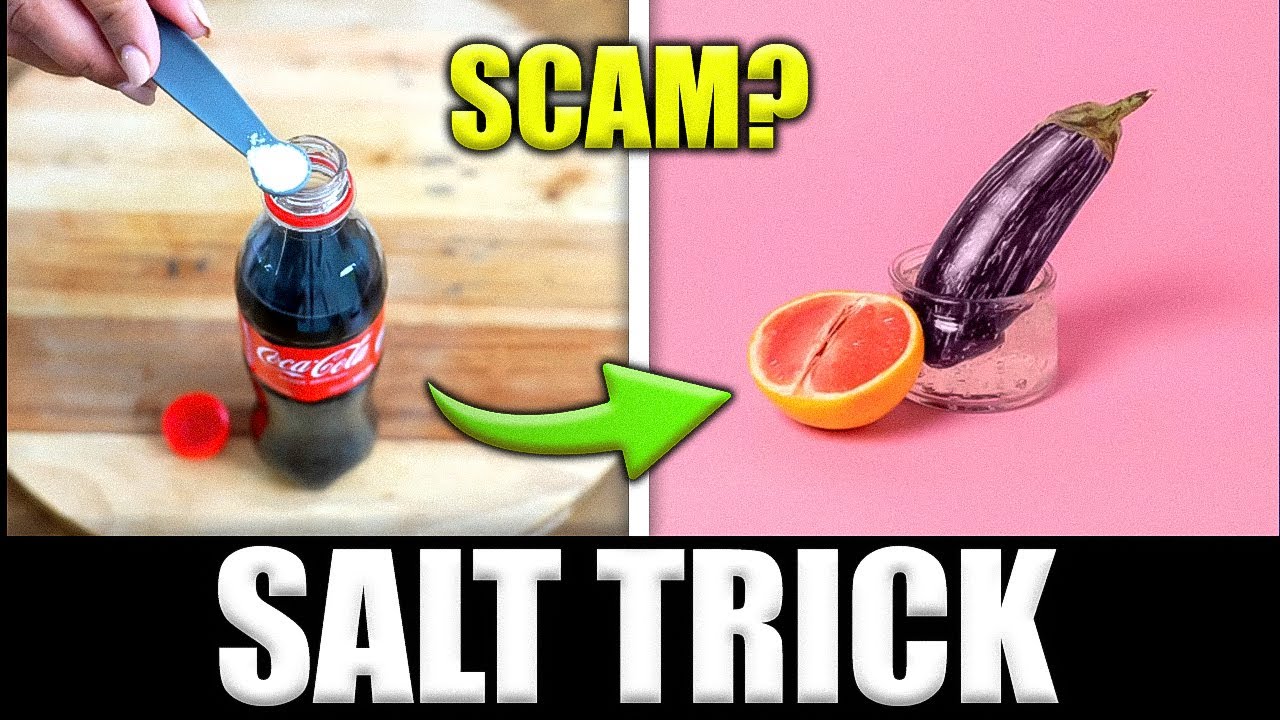Is The Salt Trick True? Debunking Myths And Understanding The Science
Have you ever heard of the "salt trick" and wondered whether it's actually true? This mysterious phenomenon has sparked curiosity among many people, but is it fact or fiction? The "salt trick" refers to various claims about salt's ability to perform seemingly magical feats, such as neutralizing odors, enhancing flavor, or even improving health. But does science support these claims?
In today's world, where misinformation spreads rapidly, it's essential to separate fact from fiction. This article dives deep into the science behind the salt trick, examining its validity and debunking common myths. Whether you're a home chef, a health enthusiast, or simply curious, this guide will provide you with the knowledge you need to make informed decisions.
By exploring scientific studies, expert opinions, and real-world applications, we'll uncover the truth about the salt trick and help you understand its potential benefits and limitations. Let's begin our journey to discover whether this popular belief holds water—or salt.
Read also:Nicole Kidman A Closer Look At Her Iconic Style And Influence
Table of Contents:
- Introduction to the Salt Trick
- What is the Salt Trick?
- The Science Behind Salt
- Health Benefits of Salt
- Common Myths About the Salt Trick
- Does the Salt Trick Work?
- Practical Uses of the Salt Trick
- Risks and Precautions
- Scientific Studies Supporting the Salt Trick
- Conclusion: Is the Salt Trick True?
Introduction to the Salt Trick
Throughout history, salt has been one of humanity's most valuable resources. From preserving food to enhancing flavor, salt plays a crucial role in our daily lives. The "salt trick" refers to various techniques or beliefs surrounding salt's unique properties, many of which have gained popularity in recent years. But is the salt trick scientifically valid?
This section explores the origins of the salt trick, its cultural significance, and why it continues to captivate people worldwide. By understanding the historical context, we can better evaluate its validity in modern times.
What is the Salt Trick?
Definition and Common Uses
The term "salt trick" encompasses a range of practices and beliefs about salt's capabilities. Some popular examples include using salt to:
- Remove odors from surfaces
- Enhance the flavor of food
- Improve respiratory health
- Neutralize acidity in cooking
While these claims may seem plausible, not all of them are supported by scientific evidence. In this section, we'll examine the most common applications of the salt trick and assess their validity.
The Science Behind Salt
Chemical Composition and Properties
Salt, or sodium chloride (NaCl), is a compound made up of sodium and chloride ions. Its crystalline structure gives it unique properties, such as:
Read also:Diva Flawless Ed The Ultimate Guide To Achieving Radiant Skin
- Hygroscopicity (ability to absorb moisture)
- Conductivity
- Flavor-enhancing qualities
Understanding these properties helps explain why salt is effective in certain applications, such as preserving food or enhancing flavor. However, its effectiveness in other areas, like health improvement, requires further scrutiny.
Health Benefits of Salt
Nutritional Value and Role in the Body
Salt is an essential nutrient that plays a vital role in maintaining bodily functions. It helps regulate:
- Fluid balance
- Neuromuscular activity
- Blood pressure
However, excessive salt consumption can lead to health issues, such as hypertension and cardiovascular disease. This section discusses the balance between salt's health benefits and potential risks, providing guidance on safe consumption levels.
Common Myths About the Salt Trick
Separating Fact from Fiction
Many myths surround the salt trick, often perpetuated by anecdotal evidence or misinformation. Some common myths include:
- Salt can cure respiratory ailments
- Salt baths detoxify the body
- Salt reduces inflammation
By examining scientific studies and expert opinions, we can debunk these myths and provide a clearer understanding of salt's true capabilities.
Does the Salt Trick Work?
Evaluating Scientific Evidence
To determine whether the salt trick works, we must rely on empirical evidence. Studies have shown that salt is effective in certain applications, such as:
- Preserving food
- Enhancing flavor
- Neutralizing odors
However, its effectiveness in other areas, like health improvement, remains inconclusive. This section evaluates the available evidence and provides a balanced perspective on the salt trick's validity.
Practical Uses of the Salt Trick
Real-World Applications
Despite some myths, the salt trick has practical applications in everyday life. Some examples include:
- Cleaning household surfaces
- Removing stains from clothing
- Enhancing the flavor of food
This section provides actionable tips and techniques for incorporating the salt trick into your daily routine, ensuring safe and effective use.
Risks and Precautions
Ensuring Safe Use of Salt
While salt is generally safe when used in moderation, excessive consumption can lead to health issues. Some risks associated with the salt trick include:
- Hypertension
- Cardiovascular disease
- Dehydration
To minimize these risks, it's essential to follow recommended guidelines for salt consumption and use. This section provides practical advice on staying safe while enjoying the benefits of the salt trick.
Scientific Studies Supporting the Salt Trick
Research and Expert Opinions
Several studies have investigated the effectiveness of the salt trick, providing valuable insights into its validity. For example:
- A study published in the Journal of Food Science found that salt enhances the perception of umami flavors in food.
- Research conducted by the World Health Organization highlighted the importance of balancing salt intake for optimal health.
By referencing credible sources, we can build a strong case for the salt trick's effectiveness in specific applications.
Conclusion: Is the Salt Trick True?
In conclusion, the salt trick is partially true, depending on the application and context. While salt is effective in certain areas, such as preserving food and enhancing flavor, its effectiveness in others, like health improvement, remains unproven. By relying on scientific evidence and expert opinions, we can make informed decisions about incorporating the salt trick into our lives.
We invite you to share your thoughts and experiences in the comments section below. Have you tried the salt trick? What were your results? Additionally, feel free to explore other articles on our site for more insightful content. Together, let's continue learning and growing in our understanding of the world around us.
For further reading, check out these trusted sources:
Article Recommendations


